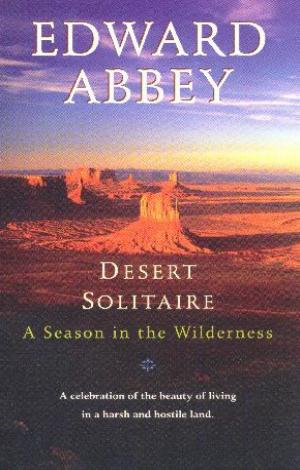
Desert Solitaire
A Season in the Wilderness
Edward Abbey
|
|
|
The classic drama of a year alone as a ranger in a national park. "This book may well seem like a ride on a bucking bronco."--New York Times Book Review
When Desert Solitaire was first published in 1968, it became the focus of a nationwide cult. Rude and sensitive. Thought-provoking and mystical. Angry and loving. Both Abbey and this book are all of these and more. Here, the legendary author of The Monkey Wrench Gang, Abbey's Road and many other critically acclaimed books vividly captures the essence of his life during three seasons as a park ranger in southeastern Utah. This is a rare view of a quest to experience nature in its purest form -- the silence, the struggle, the overwhelming beauty. But this is also the gripping, anguished cry of a man of character who challenges the growing exploitation of the wilderness by oil and mining interests, as well as by the tourist industry.
Abbey's observations and challenges remain as relevant now as the day he wrote them. Today, Desert Solitaire asks if any of our incalculable natural treasures can be saved before the bulldozers strike again. |
Patti Jo King, a Graduate Student and Historian, April 11, 2003,


Edward Abbey’s Desert Solitaire: A Season in the Wilderness, is an autobiographical account of Abbey’s stint working as a park ranger at Arches National Monument in Utah. At once this book is philosophical and poetic, yet at the same time, sardonic and polemical. Although the author would probably scowl at such pigeonholing, this book is also a significant environmental statement, as well as being a great piece of literature. In Desert Solitaire, Abbey identifies and adeptly defines a common frustration shared by many writers; the annoyance of not being able to adequately express one’s self through the medium of words. He states, “You cannot get the desert into a book any more than a fisherman can haul up the sea with his nets. Not imitation but evocation has been the goal.”
However, even through his self-styled “evocation”, he successfully and intimately enfolds his readers within his unique experience. A reluctant naturalist, Abbey blames the human inability to discern the true meaning of nature, on a tendency to always project our own expectations on the natural world. These are tendencies that exasperate him, and yet when he does achieve a near-true communion, as he describes in his experiences in isolation in Havasu Creek, he finds the encounter more disturbing than ecstatic. He describes losing the power to distinguish between himself and the natural world, creating in him a fear that his sense of self was “ebbing away.” In addition, throughout his career as a writer, Abbey refused the label “environmentalist.”
Nevertheless, his books are useful instruments with which to measure our progress, or lack of progress as the case may be, in our relationship to our natural environment. In this book’s chapter entitled, “Industrial Tourism and the National Parks”, he lays out his philosophy that “growth for growth’s sake is the ideology of the cancer cell.” Looking today at the corruption of the wilderness areas that he warned readers about three and four decades ago, it is plain to see how correct he was in his estimation and condemnation of policies pertaining to our National Parks.
Whether he admitted it or not, Abbey set a tone of uncompromising environmental advocacy. In looking at Edward Abbey, the reader is also confronted by contradiction. He passionately argues for the importance of untamed wilderness and against the danger of industrial tourism. He declares he would rather kill a human than a snake, and then casually bops a rabbit on the head with a rock, just to see what his own reaction will be. He beguiles us with his description of Arches, and then chides us for wanting to go there. These passionate paradoxes are the tools he uses most effectively to lure us away from our complacency.
Most importantly, Abbey’s work his work serves as an inspiration to new generations of Western writers and historians, making us realize that wilderness really is a necessary ingredient of civilization.


